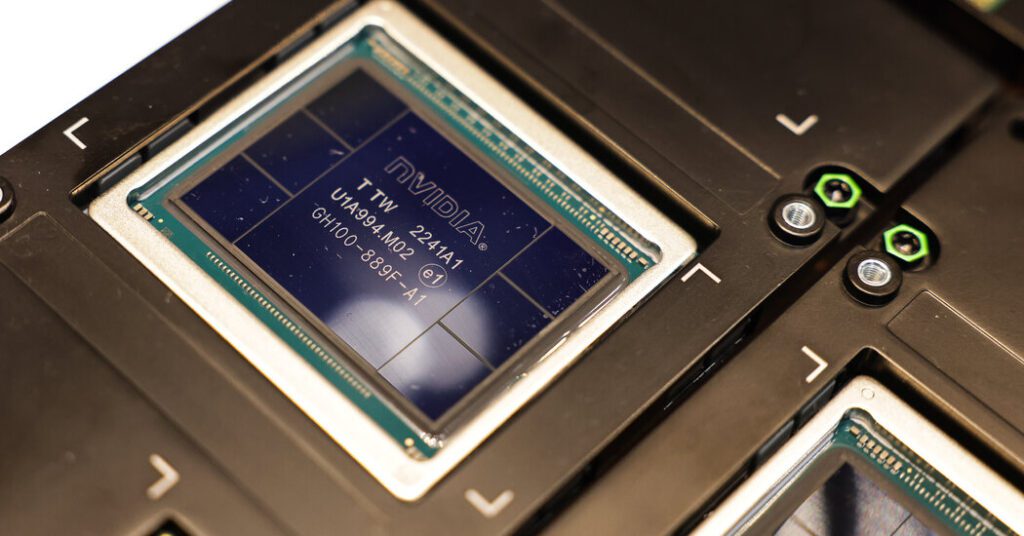DeepSeek Unveils Game-Changing AI: A New Contender in the Global AI Race
Just a day after Christmas, a little-known Chinese start-up, DeepSeek, lit up the tech world by launching its new AI system, DeepSeek-V3, which rivals the prowess of leading chatbots from giants like OpenAI and Google. This revelation was momentous, not just for its performance but for its groundbreaking approach to resources.
A Resourceful Approach
In an intriguing twist, the engineers behind DeepSeek-V3 disclosed in their research paper that they utilized only a fraction of the cutting-edge computer chips that other major players rely on. In a landscape where the U.S. and China are locked in a fierce tech competition, the U.S. government has been working overtime to restrict the sale of powerful chips—particularly those from Silicon Valley’s Nvidia—to Chinese companies. However, DeepSeek’s success raises critical questions about the effectiveness of these trade restrictions.
Constraints on chip availability have pushed Chinese researchers to think outside the box, leading to innovative solutions using readily available tools on the internet. The result? A chatbot that can tackle questions, solve logic puzzles, and even write its own computer programs, all while being developed on a budget of just $6 million. That’s about ten times less than what tech giant Meta spent on its latest AI systems.
The Cost-Effective Competition
Chris V. Nicholson, an investor at Page One Ventures with a keen eye on AI technologies, pointed out the significant shift in possibilities. “The number of companies that can invest $6 million is vastly greater than those that can invest $100 million or more,” he noted. This insight challenges the long-standing notion that only financially mighty tech firms can produce groundbreaking AI.
While large firms churn out extravagant supercomputers using upwards of 16,000 chips, DeepSeek managed to achieve comparable outcomes with around 2,000 Nvidia chips. This leap in efficiency is not just impressive—it’s a game-changer.
Navigating Regulatory Waters
According to Jeffrey Ding, an assistant professor specializing in tech and international relations, the constraints placed upon chip access forced DeepSeek’s engineers to innovate. "They had to train it more efficiently so it could still be competitive," he explained, highlighting the resilience of the team amid regulatory hurdles.
As the Biden administration tightened the screws on chip access for Chinese firms, including fresh regulations designed to curtail indirect acquisition routes, questions linger around the effectiveness of these restrictions. The primary concern remains that these advanced chips may be utilized for military applications, prompting firms to stockpile or seek alternative sources through underground networks.
Founded by quantitative stock trading firm High Flyer, DeepSeek has become a beacon for talent in China, boasting competitive salaries that lure graduates from top universities. They also employ individuals without formal computer science backgrounds, like Zihan Wang, who helps the technology navigate the complexities of poetry and challenging entrance exams.
Focused on Innovation
Interestingly, DeepSeek isn’t aimed at the consumer market, which allows its engineers to dive deep into research without the constraints of strict government regulations on AI technology. While American companies continue to push the envelope, DeepSeek is not to be underestimated. It has recently unveiled a reasoning model that’s turning heads, showcasing its commitment to technological advancement.
In a world where open-source software is gaining traction, DeepSeek has embraced this movement, sharing its underlying code for others to leverage. This collaborative spirit nurtures innovation and extends the technology’s reach globally.
The Open Source Landscape
The open-source wave saw a resurgence in 2023, sparked by Meta’s release of the LLama AI system. DeepSeek’s entry into this arena demonstrates that even smaller firms can play a significant role in shaping AI advancements. While skeptics argue that open-source technologies could lead to disinformation, others are concerned that stifling U.S. progress might grant China a substantial lead.
Ion Stoica, a professor from the University of California, Berkeley, warns that “the center of gravity of the open-source community has been shifting to China,” potentially putting U.S. advancements at risk in the long run.
Recent projects, like the Sky-T1 AI system developed by Stoica and his students, highlight the innovative potential that’s possible on a shoestring budget—requiring only $450 in computing power to rival leading technologies.
Real-World Impact
Reuven Cohen, a tech consultant, shared his experience with DeepSeek-V3, noting its competitiveness with major players like OpenAI and Google at a much lower cost. “DeepSeek is a way for me to save money,” he remarked. It’s this kind of accessibility that could redefine the landscape for businesses and researchers alike.
As we witness the evolution of AI technologies, the landscape is becoming more complex, with smaller players like DeepSeek challenging the dominance of established giants through creativity and resourcefulness.
The AI Buzz Hub team is excited to see where these breakthroughs take us. Want to stay in the loop on all things AI? Subscribe to our newsletter or share this article with your fellow enthusiasts.




